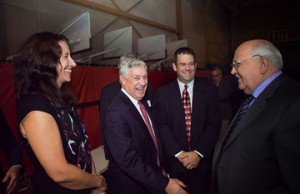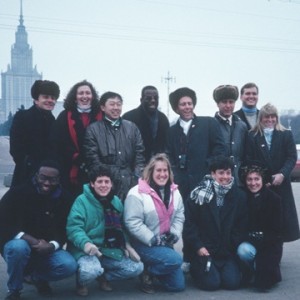
Students from the University of Kishinev came to Lafayette in April 1989. They gathered with Lafayette students who had previously visited their university in fall 1988.
In 1987, during the era of perestroika and glasnost in the Soviet Union under the leadership of Mikhail Gorbachev, Lafayette was one of the first six U.S. colleges and universities chosen to participate in an exchange program with the U.S.S.R. Endorsed by both Gorbachev and President Ronald Reagan, the program was sponsored by the U.S. Citizen Exchange Council and Soviet Student Council. Lafayette was in good company; the other U.S. schools involved were Harvard, Yale, Stanford, Williams, and the University of Maine.
Lafayette’s partner school for annual two-week “get acquainted” exchanges of students and faculty members was the University of Kishinev, located in the capital city of the Moldavian Soviet Socialist Republic.

Jackie Olich '92 (L-R), Ed Ahart '69, chair of Lafayette Board of Trustees; Josh Sanborn, professor of history and chair, Russian and East European Studies; Mikhail Gorbachev.
One of the students from the group who went in 1991–Jacqueline M. (Jackie) Olich ’92, associate director, Center for Slavic, Eurasian, and East European Studies (CSEEES), University of North Carolina-Chapel Hill–returned to Lafayette Oct. 19 to see Gorbachev, a major influence in her life. The focus of her career and intellectual life began with the inspiration she held for Gorbachev and the experiences at Lafayette that enhanced and supported it. “I started studying the Russian language and Russian Studies in 1988 because of Gorbachev,” she says. “I took a January interim course to the Soviet Union in 1990, which was a remarkable experience and had a tremendous impact on me. Then I had the great privilege to be chosen to participate in the exchange program in 1991.”
Watch a video of Olich’s comments from the night of Gorbachev’s lecture:
The program at Lafayette was led by Rado Pribic, Oliver Edwin Williams Professor of Foreign Languages and Literatures and co-chair of the international affairs program. Funded by the College, it was open to juniors, who were selected to participate through a competitive process. Those chosen were required to take a preparatory seminar, “How We See Each Other: The U.S. and Soviet Perceptions and Realities” taught by Pribic, who also was a director of the Citizen Exchange Council.
The first Lafayette participants, made up of members of the Class of 1989, were originally scheduled to travel in spring 1988 but did not make the trip until fall of their senior year.

The group of 13 seniors who traveled to the Soviet Republic of Moldavia in fall 1989 included Jill Edwards, Clayton Evans, Matthew Forys, Kristina Friberg, Emily Kissel, Kevin Marks, Nancy Nickla, Edwin Raynor, Sarah Readinger, Renee Robbins, Jill Spiess, Gail Staron, and Gerald Tozin. They were accompanied by Prof. Rado Pribic and then Assistant Professor Lisa Langenbach. Photo courtesy of Jill Edwards Hughey.
The first delegation of students from the University of Kishinev visited Lafayette in spring 1989.

Two gifts presented to the College by students from University of Kishinev: a sterling/crystal decanter engraved with “Peace to Your Home,” Lafayette College, and University of Kishinev; and a hand-woven wool table runner.
Lafayette subsequently sent two more delegations to the Soviet Union, one in May 1989 and another in May 1990, and hosted two additional groups of students from Kishinev. The College’s agreement with Kishinev was for three years and was not renewed at the end of that period.
“Judging by the large number of applications from our students, from the enthusiastic participation in the travel program and the required preparatory course, and from the reactions after the students’ return, our exchange with the Kishinev University is a great success,” Pribic said in 1990. “Additionally, the visit of the Soviet students to our campus certainly broadens the experiences of more of our students.”
Lafayette also was a member of the East West Consortium for Academic and Cultural Exchanges, which allowed U.S. undergraduates to study for a full year at a Soviet university and gave Soviet students the opportunity to study at an American university for the same length of time. In 1989-90, Doug Epstein ’91 studied at Odessa State University and Jeff Steele ’90 studied at Leningrad State University. Prior to that, four Soviet students spent a year at Lafayette, including Igor Ostapets of Belarus and Toomas Tamm of Estonia.
“We can say that Lafayette College can look at itself as one of the leaders in the U.S.-Soviet undergraduate student exchanges,” Pribic said. “With these programs we have added new academic, cultural, and personal opportunities, not only for our students, but for the whole community.”
